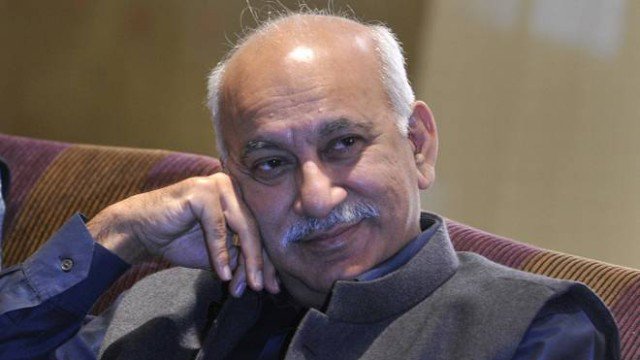From a Journalist to Sexual Predator – ‘Me Too’ campaign exposes MJ Akbar
By Ghazala Wahab [taken verbatimly from theWire.in]
As the #MeToo campaign hit India, I tweeted on October 6 that, “I wonder when the floodgates will open about @mjakbar.” Soon enough, friends and former colleagues from the Asian Age, where M.J. Akbar was the editor when I joined as an intern in 1994, reached out. Why don’t you write about your ‘Akbar story’, they urged. I wasn’t sure if it was a dignified thing to do after over two decades. But when the messages persisted, I thought about it.
I spent the weekend replaying those harrowing six months in my mind. Something that I had locked away in a remote corner of my mind still gave me goose-bumps. At some point, my eyes welled up and I told myself that I will not be known as a victim; that those six months in 1997 meant nothing to me and do not in anyway define my personality. I decided not to follow-up my tweet. It is one thing to discover that your idol has the base instincts of an animal and quite another to declare it to the world. But the messages persisted. Some said that maybe my account will give courage to others to come out too. So, here is my story.
In 1989, when I was still in school, my father presented me with a copy of Akbar’s Riot After Riot. I devoured the book in two days. I then bought India: The Siege Within and Nehru: The Making of India. I quietly pushed Freedom at Midnight, O Jerusalem and Is Paris Burning to one side. I had a new favourite writer.
While I had decided to be a journalist even before I knew how to spell the word, exposure to Akbar’s books turned desire into passion. So that I did not lose focus, I enrolled in a bachelors’ course in journalism after school. When I landed a job in the Delhi office of The Asian Age in 1994, I was convinced that it was destiny that brought me there; so that I could learn from the best in the business.
But learning had to wait. First, the illusion had to shatter. Akbar wore his erudition lightly. A little too lightly. He screamed, he swore and he drank in the office. ‘You are too small town-ish,’ a senior colleague rapped me. So, I swallowed my small-townish mentality and for the next two years accepted everything as part of the office culture — Akbar’s flirtation with young sub-editors, his blatant favouritism and his bawdy jokes. I heard people refer to the Asian Age Delhi office as Akbar’s harem— there were far too many young women than men. And I also frequently heard office gossip about his affairs with sub editors/ reporters or that in every regional office of the Asian Age he had a girlfriend. I shrugged all of it as office culture. I was in the periphery of his attention and remained unaffected.
In my third year at the Asian Age, the office culture hit home. His eyes fell on me. And my nightmare began. My desk was shifted to just outside his cabin, perpendicularly opposite his desk, so that if the door to his room was left slightly open, I was face to face with him. He would sit at his desk and watch me all the time, often sending me lewd messages on the Asian Ageintranet network. Thereafter, emboldened by my obvious helplessness, he started calling me into his cabin (the door to which he would always shut) for conversation, most of which was personal in nature. Things like my family background and how I was working and living alone in Delhi against the wishes of my parents.
Sometimes, he would make me sit opposite him while he was supposedly writing his weekly column. The idea was that if he needed to look up a word in the gigantic dictionary placed on a low tripod on the far end of his cabin, he would ask me instead of walking across the room.
The dictionary was placed so low that one needed to either bend down or squat to look up a word, with one’s back towards Akbar. Once, in autumn of 1997, while I was half-squatting over the dictionary, he sneaked up behind me and held me by my waist. I stumbled in sheer fright while struggling to get to my feet. He ran his hands from my breast to my hips. I tried pushing his hands away, but they were plastered on my waist, his thumbs rubbing the sides of my breasts.
Not only was the door shut, his back blocked it. In those few moments of terror, all sorts of thoughts ran through my mind. Finally, he released me. All this while, the wily smile never left his face. I ran out of his cabin and into the toilet to cry my eyes out. The horror and the violation that I felt completely overwhelmed me. I told myself that this would not happen again and that my resistance would have told him that I did not want to be ‘one of his girlfriends.’ But my nightmare had just begun.
The next evening, he called me in his cabin. I knocked and entered. He was standing next to the door and before I could react he shut the door, trapping me between his body and the door. I instinctively flinched, but he held me and bent to kiss me. With my mouth clamped shut, I struggled to turn my face to one side. The jostling continued, without much success. I had no space to manoeuvre. Fear had rendered me speechless. As my body was pushing against the door, at some point he let me go. Tear-stricken, I ran out. Out of the office. Out of the Surya Kiran building and into the parking lot. Finding a lonely spot, I sat down on the pavement and cried.
My whole life loomed in front of me. I was the first person in my family to come out of my home town Agra to study in Delhi and thereafter work. In the past three years, I had fought several battles at home to be able to live and work in Delhi. Women in my family only studied but never worked. In small town business families, girls always settled for arranged marriages. I had fought against this patriarchy. I had refused to accept money from my father because I wanted to make it on my own. I wanted to be a successful, respected journalist. I just couldn’t quit and go back home as a loser.
A colleague, Sanjari Chatterjee, had followed me into the parking lot. She had seen me run out of his cabin with tears rolling down my face. She sat with me for a while. Why don’t you tell Seema Mustafa about this, she suggested. Perhaps, she can talk with Akbar and once he knows that she knows, maybe he will back off. Seema was the bureau chief then. We both came back to the office. I went into her cubicle and narrated my story. She heard me. She was not surprised. She said that the call was entirely mine; that I should decide what I wanted to do. This was 1997. I was alone, confused, helpless and extremely frightened.
Finally, I returned to my desk. I sent him a message on Asian Age’s netware messaging system. I told him how highly I regard him as a writer; how this behaviour ruins that image of his in my mind and how I do not want him to behave like this with me again.
He immediately called me in his cabin. I thought that he would apologise. I was wrong. He looked pained at my protests and proceeded to give me a lecture on how I was humiliating him by suggesting that his emotions for me were not genuine…
On my way back home that night, I finally accepted that the situation at work was going out of my control. I had to find another job. And so, I started to look for a job. Every moment that I spent at the Asian Age office was full of dread. Every time he called me in his cabin, I died a thousand times. I would enter his room, with the door slightly open and with my hand on the door knob. This amused him. Sometimes, he would walk over to the door and put his hand over mine; sometimes he would rub his body against mine; sometimes he would push his tongue against my pursed lips; and every time I would push him away and escape from his room.
Then my colleague, who had by now become my guardian angel, devised a ploy. Whenever I was called to his cabin, she would wait a moment and follow me inside on some pretext or the other. She became my safety valve.
But this worked only to some extent. Having realised that he was not getting his way physically, he employed emotional tactics. One evening he called me in to his office and pleaded with me to go the Ajmer dargah to tie a thread for him. Apparently, he could not trust anyone to do the job. I stayed home pretending to have gone to Ajmer. But somehow, he caught on my lie and heaped religious guilt on me. By now I was a mess of conflicting emotions – I was guilty. I was insecure. And most of all, I was petrified. Office no longer represented independence to me. It was a torture chamber, I was desperate to get out of, but couldn’t find the door. I foolishly still believed that I would be able to quit with dignity once I found another job.
Since I continued to resist (in my limited way) his physical overtures, he fired another salvo to break my defences – Veenu Sandal, the Asian Age tarot card reader who used to do a weekly column. Over time, she had become Akbar’s private astrologer. After one particularly harrowing afternoon, when he shooed-off my protective colleague from his office so that he could paw me, Veenu came to my desk and told me that Akbar was truly in love with me. And that I should give him time to show me how much he cared.
I was disgusted at this animal. Could he be real? Can his sense of entitlement be so huge that he employs an astrologer to pimp for him? At that point, I was no longer sure of anything. What will happen if I continue to resist him? Will he rape me? Will he harm me? I considered going to the police, but got scared. What if he gets vengeful? I considered telling my parents, but I knew that would be the end of my barely-begun career.
After several sleepless nights, I figured that staying on in the Asian Age while looking for another job was no longer an option. That I must quit immediately. So, I mustered courage and told him that I was quitting. He lost his balance. He hollered while I cowered in my chair. Then he got all emotional and held me urging me not to leave him. I came out of his room shaking to the bones. This was turning into an unending nightmare which affected every aspect of my life. I lost my appetite. I lost my sleep. I lost my desire to hang out with my friends.
Then it got worse. Akbar told me that he was launching an edition from Ahmedabad and wanted me to shift there. All my protests about my parents not allowing me to shift were brushed aside as he started to loudly plan. I would be given a house in Ahmedabad and everything would be taken care of by the company. And whenever he came there, he would stay with me.
My panic shot through the roof. In that moment of pure terror, I discovered a reservoir of calm within. I stopped protesting. Slowly, over the next few weeks I started clearing my desk, taking my books etc., home, a few at a time. So that the evening before my departure for Ahmedabad, my desk was clear. Handing over a sealed envelope which had my resignation letter to Akbar’s secretary I left the office at the usual time. I requested her to give the envelope to him only the following evening, well after it would be discovered that I hadn’t taken the flight to Ahmedabad.
Next day, I stayed home. In the evening, Akbar called on my home phone number. He had taken my number from the office. He raved – angry and emotional by turns. I was petrified. What if he comes home? I stayed awake the whole night and boarded the first train to my parents the next morning. Nobody asked me anything at home. My parents sensed that all was not well. The fight had gone out of all of us. I stayed home for a few weeks. Then when I told my father that I wanted to return to Delhi to my job, he didn’t protest. All he said was, look for another job. And I broke down.
In the last 21 years, I had put all this behind me. I was determined not to be a victim, and not let one monster’s debauchery ruin my career, even though occasionally I had nightmares. Maybe now the nightmares will stop.
[theWire.in mentions “The Wire had written to M.J. Akbar on October 9, 2018 seeking his response to the accusations several women had made against him. We will inform our readers of any reply we receive from him.”]



